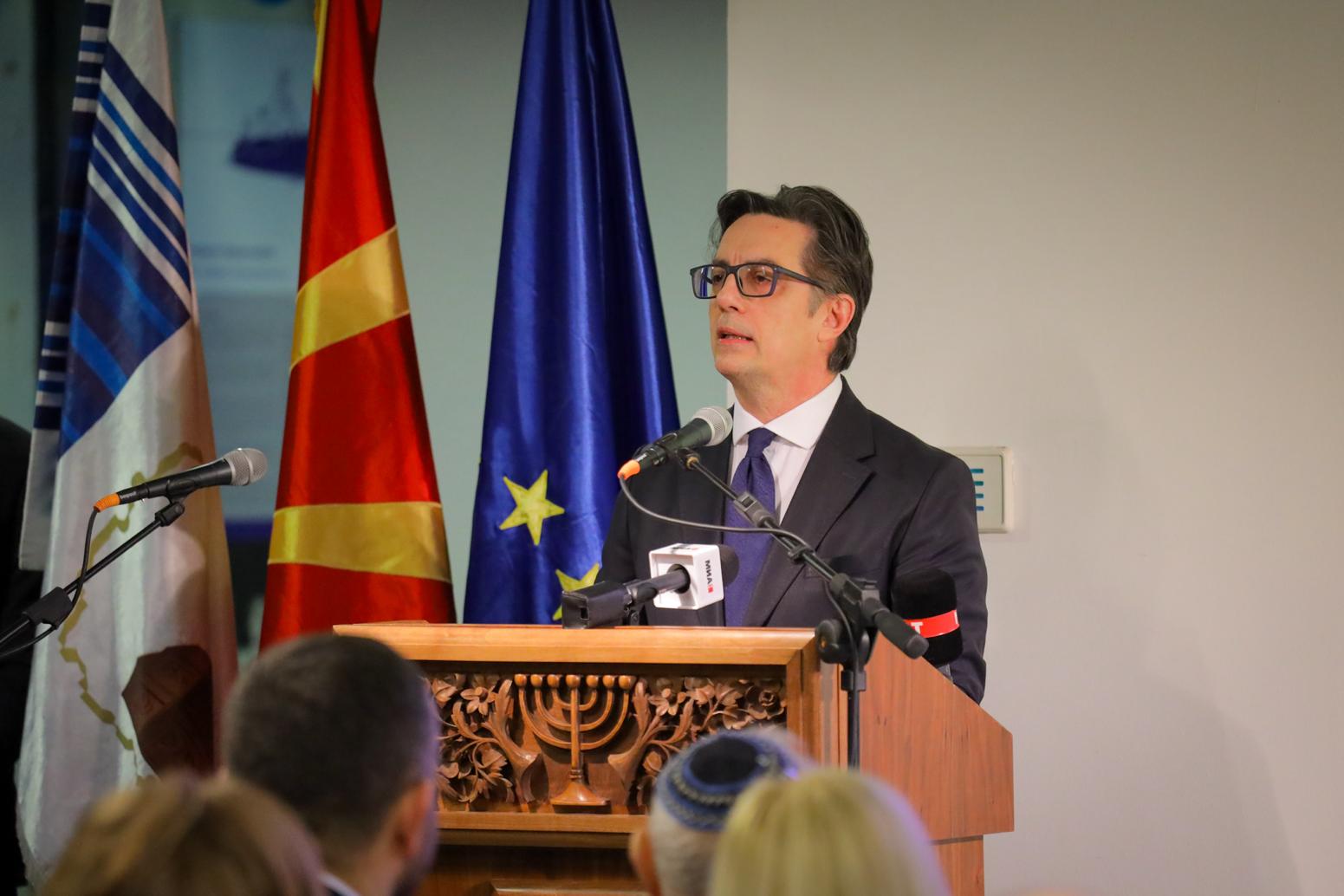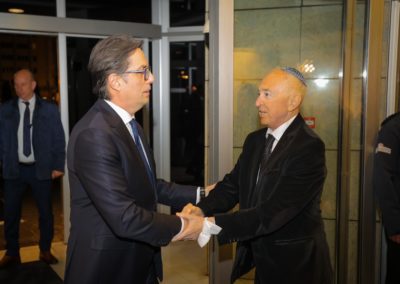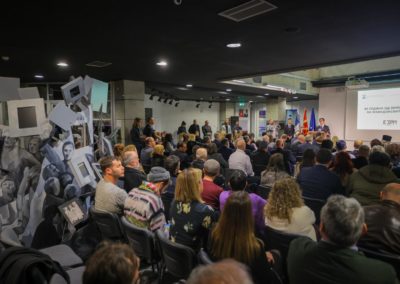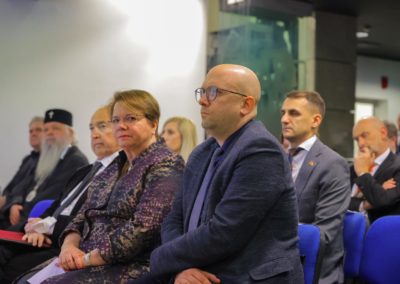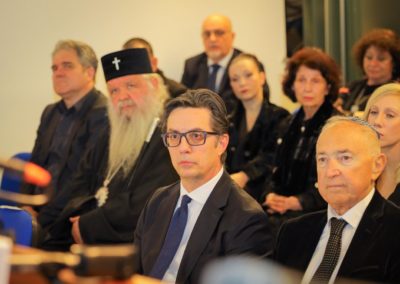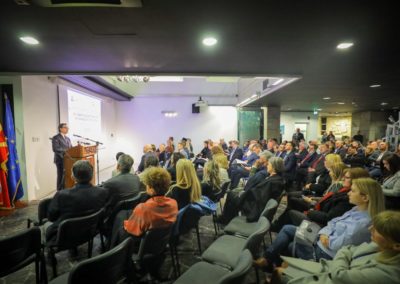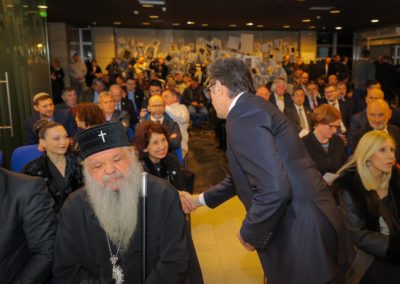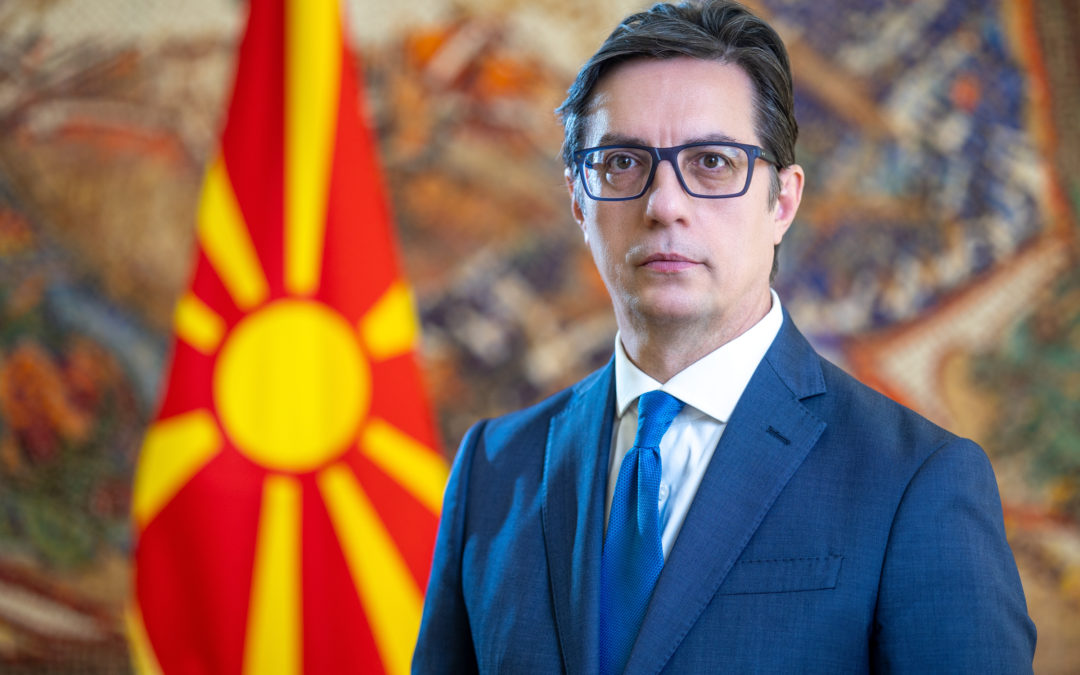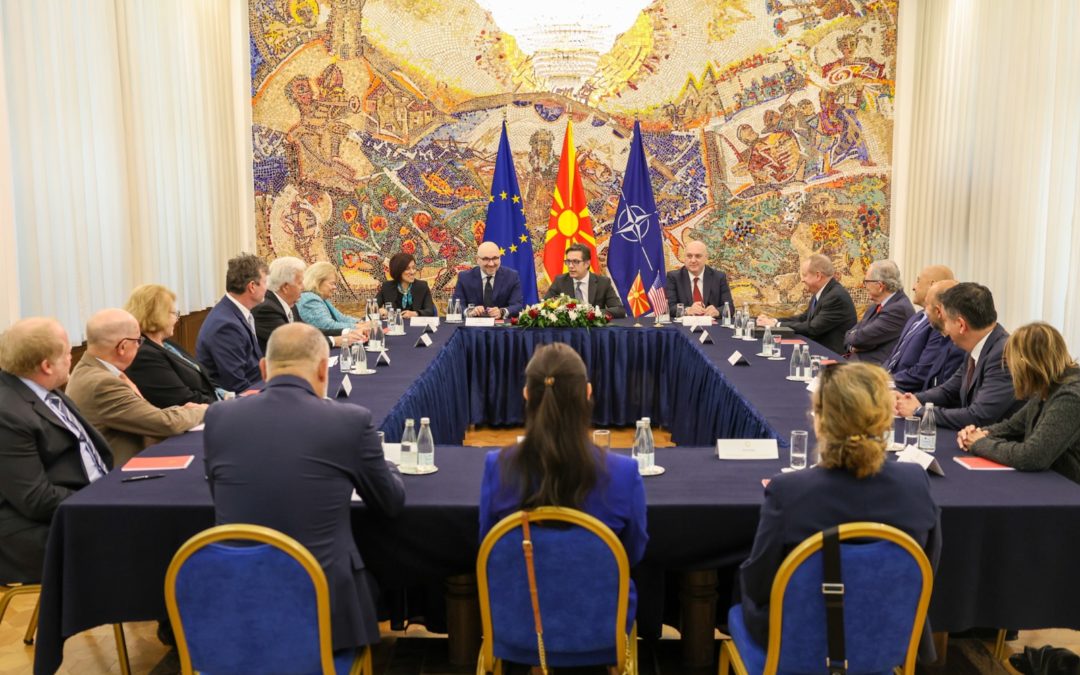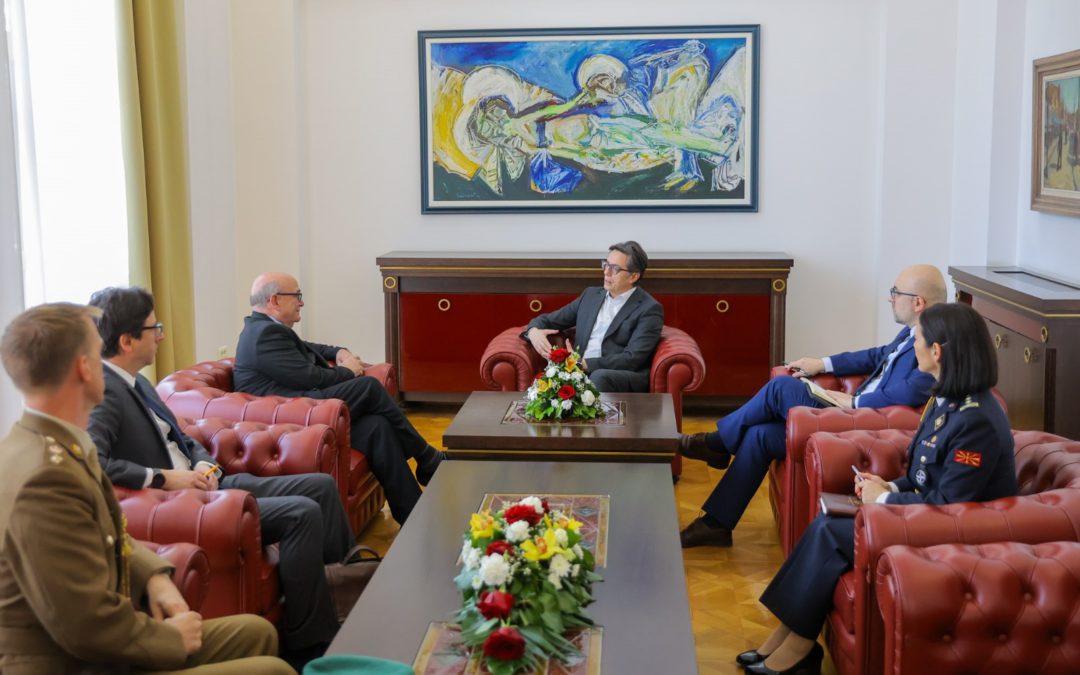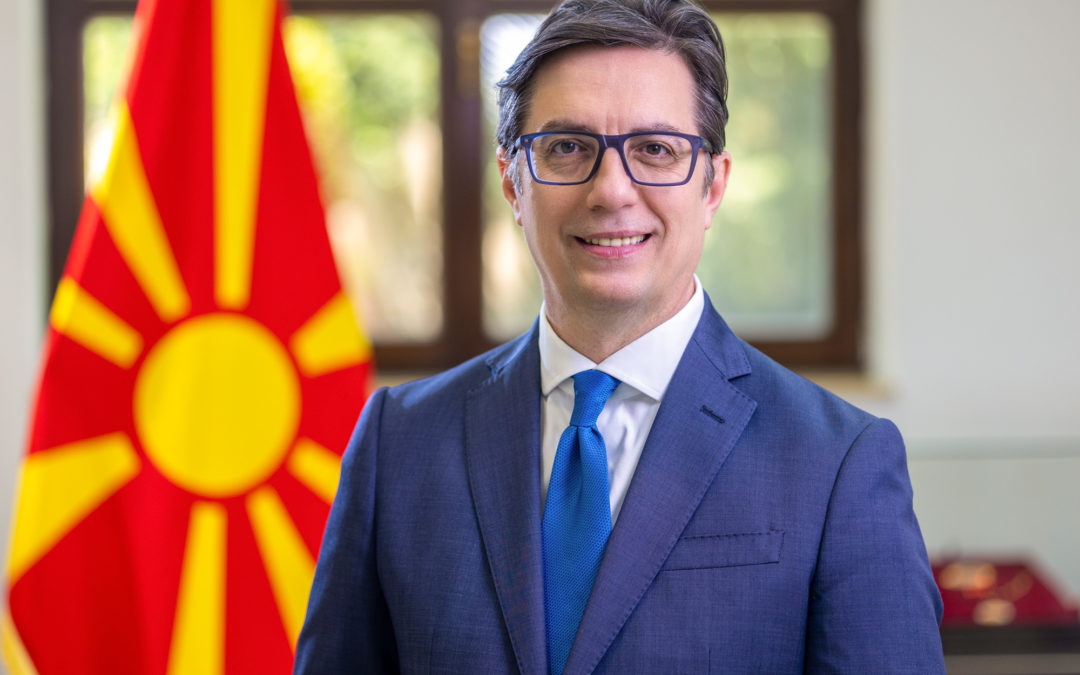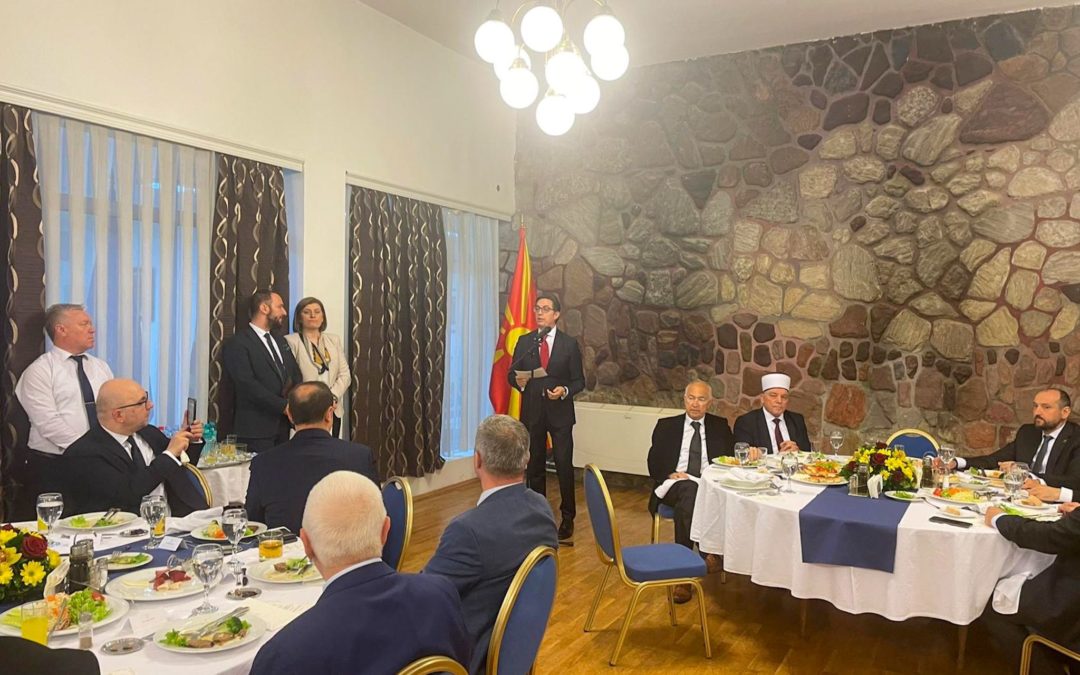On the occasion of the 81st anniversary of the Holocaust of the Macedonian Jews, President Stevo Pendarovski addressed the commemoration held at the Memorial Center of the Holocaust of the Jews in Macedonia yesterday evening.
At the commemoration, the film “Monopoly” by Gal Genosar, based on a true story of a Macedonian Jewish family, was featured, and the President of the Jewish Community, Pepo Levi, the Ambassador of the State of Israel, Simona Frankel, and the German Special Envoy for the Western Balkans, Manuel Saracen, also delivered their speeches.
Respected President of the Jewish Community,
Respected Director of the Fund of the Holocaust of Macedonian Jews,
Distinguished Excellences,
Dear Attendees,
Unwritten rule is that the streets of capital cities are named after heroes and humanists, after significant uprisings and victories. An example of that are the streets in Skopje: “Ilindenska”, “Partizanska”, “October 11”, “November 13”, “May 9”. But, there is a street that is an exception to this rule, because it is not named after a victory, but after a defeat, the defeat of humankind and humanity. It is the small street where the Memorial Center of the Holocaust of the Macedonian Jews is located today and is named after today’s date – “March 11”.
On this day, 81 years ago, Jews from Skopje, Bitola and Shtip were forcibly taken from their homes and transported to the Skopje Monopol building. The lively Jewish neighborhood that was located on the place where we are gathered today was emptied and deserted in an hour. It was not accidental or spontaneous, but a thoroughly planned and implemented action by the Bulgarian fascist occupier. The action was not an isolated act, but an integral part of the Nazi plan laid down at the Wannsee Conference for the “final solution of the Jewish issue”. The plan envisaged a systematic destruction of the entire Jewish population from Europe, including the Jews from the territory of the then occupied Macedonia.
Even today, almost eight decades after the end of the World War II, no one can give a rational answer to the question of how it was possible for the evil of the Holocaust to happen in the most economically developed continent, among, until then, the most educated and sophisticated generation.
There are numerous reasons thereof. The virus of anti-Semitism that had been simmering in Europe for centuries perceived the different as enemies. It was followed by the ideological nihilism that divided peoples and nations into superior and inferior. Finally, the rapid scientific and technological progress provided both the means and the methods to achieve the goal. These are some of the factors that created a moral vacuum in which the categories of good and evil were suspended, resulting in discrimination, dehumanization and mass extermination of Jews in the Nazi camps.
The sole purpose of these industrial complexes was to destroy the greatest number of people in the shortest possible time. The gas chambers at Treblinka had the capacity to kill between 12 and 15 thousand people a day. In just 13 months, from August 1942 to September 1943, about 900,000 people were systematically murdered. Among them were the Macedonian Jews who, at that time, represented 98% of the total Macedonian Jewish population, and one third of the total number of Macedonian victims in the World War II. Nowhere in Europe was the “final solution of the Jewish issue” implemented more effectively than in the then-occupied Macedonia.
The testimonies of the survivors of the Nazi camps freeze the blood. “Everybody doubted something was going on”, says one witness. “They clearly felt something was wrong … but none of them in their wildest nightmares could have imagined that within three or four hours they would be reduced to ashes”. Survivors agree that their languages lacked the words to express this undoing of man.
In his memoirs, Simon Wiesenthal recalls a conversation he had with an SS officer before the end of the war. “Imagine”, the SS officer said, “arriving in New York, and people ask you: ‘How was it in those German concentration camps? What did they do to you there?’”
Wiesenthal replied that he would probably tell them the truth. And the SS officer cynically told him: “… do you know what will happen? No one will believe you […] How could anyone even believe this horror – unless they experienced it themselves?”
One of the survivors of Auschwitz, Primo Levi, echoes Wiesenthal, claiming that this same thought haunted the prisoners themselves. Namely, that almost all survivors remember a dream, different in details, but unique in essence: “that they have returned home, that they tell their loved ones […] about their past sufferings, but that they do not believe them, do not even want to hear them”, because the testimonies are too monstrous to be believed.
Respected Attendees,
The Macedonian Jews who were deported to Treblinka were deprived even of the possibility to dream, let alone speak, because only hours after their arrival, all of them were processed, stripped, taken to the gas chambers, and their lifeless bodies were burned. None of them can speak, because none survived.
Their names, 7,144 in number, meticulously recorded by the fascists, are today written under the three urns with ashes from Treblinka. We have no right to forget, because forgetting is their second death. Still, our memory must not be selective. By preserving the memories of the victims, we must not allow the perpetrators to be celebrated and the accomplices to be rehabilitated. Because in that way we would participate in what Primo Levi called a war against memory and falsification of history. We must not allow falsification of the truth about the Holocaust of the Macedonian Jews because the compromise with the truth opens up the possibility of repeating the crimes.
Ladies and Gentlemen,
Anti-Semitism is not and has never been a Macedonian phenomenon. In this region, there has been a centuries-old inter-ethnic and inter-religious coexistence and respect for diversity. There is no stronger proof of this than the fact that a large part of the surviving Macedonian Jews, those who were saved and avoided deportation, actively joined the national liberation and anti-fascist struggle of the Macedonian people. Among them there are partisans, national heroes and participants in the state-founding session of ASNOM. The surviving Jewish community contributed to the construction of the free Macedonian state. Therefore, although it is small in number today, the Jewish community in North Macedonia is highly respected.
We must indeed preserve this truth and pass it on to future generations. We need to educate our pupils and students, our youth about the evil of anti-Semitism and the danger of xenophobia. These are also obligations that we as a country undertook at the International Holocaust Forum in Malmö. Although it is neither easy nor pleasant to explore this abyss of evil, it is nevertheless necessary, so that we do not allow the evildoers to have the last word.
Thank you.
